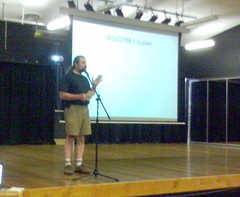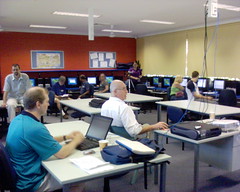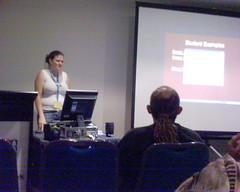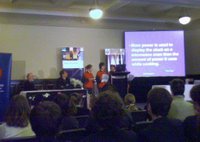The
ACEC2006 (2-4 October 2006 Cairns, Queensland, Australia) conference had a strong games theme as well as a full day pre-conference session on computer games (1 October)
Pre-conferenceOpening address,
M. Hawney Dr Bernard Holkner, Monash University, introduces the Games Cluster
Dr Bernard Holkner, Monash University, introduces the Games ClusterThe pre-conference session had 2 hands on sessions for beginners
Game Maker and one for advanced
Game Maker. You can download the resources for
beginners and
advanced classes.
 Bill Kerr leads "gamemaker for beginners, (Al Upton and Roland Gesthuizen left)
Bill Kerr leads "gamemaker for beginners, (Al Upton and Roland Gesthuizen left)Panel session on Games as Pedagogy
ASISTM Cluster
Using Action Scripting as basis for Object Oriented Programming in IPT
Allan MorrisonMaking Interactive 2D games for Middle school year levels (Flash)
Kristine KopelkeMobile Phone programming Miranda ForwoodAnatomy of a games project as perceived by students
Mike Hawney
SiMERR –QSITE Presentation sharing results of the project to date
Project LeadersMain ProgramWhat is it about digital media games that engrosses young boys: a study in the sub-culture of Yu-Gi-Oh and its potential for improving educational outcomes,
T. de Jong.
PaperGamemaker, getting started, again used Bill's Space
Invaders tutorial.
 Bill Kerr leads "gamemaker getting started"
Bill Kerr leads "gamemaker getting started"Developing a holistic approach to integrating games in education: The Queensland Games in Learning Project,
M. Piper abstractIntegrating games in learning: where's the PC ?,
M. Piper abstractThe games students play,
J. Gordon,
paperGame programming: the Computer Game Design, Programming, Multimedia and Mathematics Cluster,
T. Forster,
paper,
podcast,
presentationDeal or No Deal and Gran Turismo 4 in the classroom,
V. Chandra,
paperGameMaker at Gillen: indigenous education,
K. Urquhart,
paper Kym Urquhart, Gamemaker at Gillen
Kym Urquhart, Gamemaker at GillenLearning and teaching in the contexts of creating computer games,
B. Holkner,
abstract ,
paperGames in learning,
B. Kerr, T. Forster, M. Piper,
paper,
wiki,
discussion paperTeaching game making: facilitated by blogs and wikis,
B. Kerr,
paper,
presentation,
podcastEducational games: how purchaser attitudes and markets influence design,
S. Martinez,
paperGirls, programming and an introduction to Macromedia Flash actionscript,
C. Stieler,
abstractLabels: ACEC, gamemaker, games








